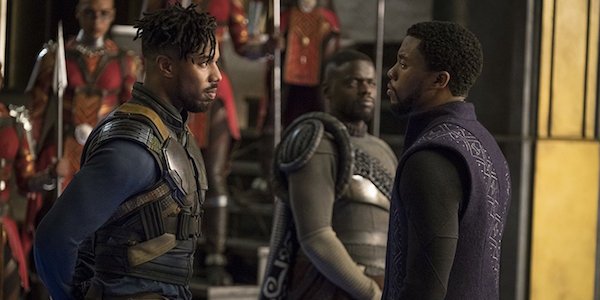How Captain America: Civil War Really Sets Up The Difference Between T’Challa And Killmonger

Warning: SPOILERS for Black Panther are ahead!
Captain America: Civil War was an especially important movie in the Marvel Cinematic Universe, not just because it fractured the Avengers, but because it also introduced several integral characters to this franchise. Chadwick Boseman's T'Challa, a.k.a. Black Panther, was one of those characters, leaping into action following the death of his father, T'Chaka. Nearly two full years later, T'Challa can currently be seen in the Black Panther movie, where he clashes with Michael B. Jordan's Erik Stevens, a.k.a. Killmonger. Although T'Challa and Killmonger are similar in a few ways, producer Nate Moore noted that Captain America: Civil War set up the major difference in Black Panther, namely how at this point in his life, T'Challa wouldn't give in to a need for vengeance. As Moore put it:
You feel the sympathy but you realize he never got over this awful thing that happened to him as a kid, right but was never able to circumvent that and become a good person. He actually becomes a bad person because of it, because vengeance consumes him to a degree he becomes a killer and has plans of essentially mass murder. Interestingly enough, T'Challa makes the opposite choice at the end of Captain America: Civil War, right? So there, he's confronted with Zemo and decides not to do the thing that I think Killmonger would have done immediately. That is where they are two sides of a different coin in a way because the men who they are dictate how they react to that very tragic circumstance.
Nate Moore has a good point. After T'Chaka was murdered in Captain America: Civil War, T'Challa tried to kill Bucky Barnes, who was originally believed to have carried out the bombing. However, upon learning that Helmut Zemo was his father's true killer, T'Challa decided that rather than take the antagonist's life, he'd let him live, surrendering him into Everett Ross' custody. In sharp contrast, Nate Moore mentioned during his appearance on The Empire Film Podcast that Killmonger probably would have killed Zemo instantly. He was never able to effectively cope with losing his father at a young age, which resulted in him becoming the villain we see in Black Panther. It's not absolutely necessary to watch Captain America: Civil War before Black Panther, but it does help with following along with T'Challa's personal journey and comparing him to Killmonger.
It was revealed in Black Panther that Killmonger was actually N'Jadaka, the son of Sterling K. Brown's Prince N'Jobu, the brother of T'Chaka. N'Jobu was killed by T'Chaka when the former tried to kill Zuri, and it was decided that N'Jadaka should remain in the United States to keep what had happened a secret. Fast-forward to the present day, Killmonger, now an elite special forces operative, successfully attained the Wakandan throne and nearly succeeding in sending vibranium weaponry to Wakandan operatives across the globe, but he was stopped by T'Challa and his allies, and in the end, Killmonger opted to die rather than spend the rest of his life imprisoned.
Killmonger's time in the MCU is over (assuming he isn't miraculously resurrected comic book-style), but you can reunite with T'Challa and several members of his supporting cast when Avengers: Infinity War is released on May 4.
Your Daily Blend of Entertainment News

Connoisseur of Marvel, DC, Star Wars, John Wick, MonsterVerse and Doctor Who lore, Adam is a Senior Content Producer at CinemaBlend. He started working for the site back in late 2014 writing exclusively comic book movie and TV-related articles, and along with branching out into other genres, he also made the jump to editing. Along with his writing and editing duties, as well as interviewing creative talent from time to time, he also oversees the assignment of movie-related features. He graduated from the University of Oregon with a degree in Journalism, and he’s been sourced numerous times on Wikipedia. He's aware he looks like Harry Potter and Clark Kent.
